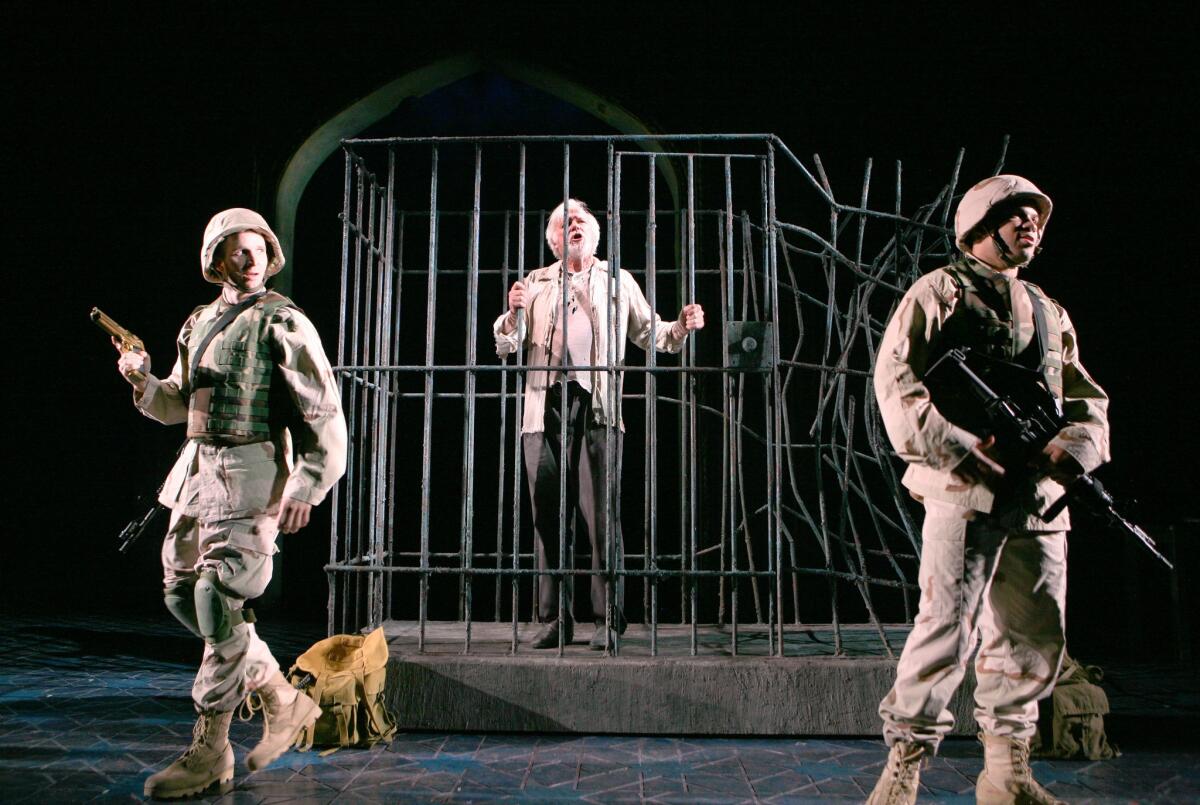Michael Ritchie will retire from Center Theatre Group and ‘make space’ for a new voice

- Share via
As the pandemic ebbs in the United States and live theater inches closer to a full-scale reopening, Center Theatre Group’s longtime artistic director, Michael Ritchie, said he’s certain of two things: The American stage is poised for a post-pandemic rebirth, and he is not the one to lead the way.
Ritchie on Thursday announced plans to retire from Los Angeles’ largest nonprofit theater company on Dec. 31 — more than a year before his contract ends — after 17 years as one of the city’s most powerful arbiters of culture. By the time he oversees the Ahmanson’s highly anticipated November reopening, Ritchie will have presented 266 productions, including 49 world premieres, at the Ahmanson Theatre and Mark Taper Forum in downtown L.A. and the Kirk Douglas Theatre in Culver City.
Michael Ritchie is stepping down as artistic director of L.A.’s most important theater company. What can his replacement — or replacements — do differently?
Critically acclaimed successes under Ritchie’s leadership include the 2005 U.S. premiere of “The Drowsy Chaperone,” which went on to win five Tony Awards on Broadway the following year; the 2008 world premiere of the rock musical “Bloody Bloody Andrew Jackson,” which landed on Broadway two years later; and the 2014 world premiere of “Marjorie Prime,” a sci-fi exploration of computer-programmed companionship that later was a finalist for the Pulitzer Prize in drama.

Ritchie said in an interview that his time had run its course, and that he wants to make room for a fresh creative voice whose perspective may be completely new and different.
“There was nothing good that came out of COVID or the George Floyd murder,” Ritchie said, “but those two things together made us and everybody else step back and say, ‘What are we doing, why are we doing it, and where is my value to the conversation, the decision-making and the future?’”
He added: “It’s time for me to stop, and it’s time to make space for other people.”
The racial reckoning unleashed by Floyd’s death hit American theater hard, with Center Theatre Group called out by BIPOC staff members and others for a lack of diversity and inclusion. Last June an alliance of BIPOC theater makers, including Lynn Nottage, Lin-Manuel Miranda and Quiara Alegria Hudes, issued a list of demands under a collective letter titled “We See You, White American Theater.” In February the group published a progress report that included a commitment to change made by CTG, which acknowledged being “complicit in the culture of white supremacy and anti-Blackness that dominates our field and our society.”
Playwrights David Henry Hwang and Rajiv Joseph, both of whom were nominated for Pulitzer Prizes for plays produced by CTG under Ritchie’s guidance, were signatories on the We See You list. In interviews with The Times this week, Hwang expressed admiration for Ritchie’s contributions to theater as well as for his decision to step aside during this pivotal moment in time.
“He could spearhead this rebirth if he wanted to, but it’s important and generous for older artistic leaders, white artistic leaders, to start to pass things on to younger, more diverse groups,” Hwang said.
Hwang’s most recent collaboration with Ritchie was the 2018 Ahmanson world premiere of “Soft Power,” which Ritchie/CTG co-commissioned and nurtured throughout its development into a wild musical featuring a 23-piece orchestra and a mostly Asian cast; it takes place 50 years after the 2016 election when China is the dominant global leader.
Hwang called Ritchie’s support of the musical “maybe the bravest act of producing in the theater that I have been fortunate enough to be a part of in my career.”
Critics of CTG and Ritchie wished that the kind of soup-to-nuts support of the creative process — from the commissioning of original work to its full realization onstage and beyond — was something the company did more often. Some said that the Ahmanson was little more than a Broadway pipeline, but Ritchie stands behind the programming, saying that risk-taking rarely made financial sense at the Ahmanson and was best reserved for the Taper and Kirk Douglas, which are better known for staging more experimental, cutting-edge work.
Ritchie commissioned Joseph to write “Archduke,” which staged its world premiere at the Taper in 2017. The playwright said he finds it hard to believe that he would have a career without Ritchie and his company. Joseph’s relationship with Ritchie goes back to 2010, when CTG was the only regional theater company willing to produce his play “Bengal Tiger at the Baghdad Zoo,” which went on to critical success. It was a Pulitzer finalist and opened on Broadway in 2011 with Robin Williams in the title role.

“Michael took chances on people like me when he didn’t need to, and those chances resulted in some pretty wonderful artistic works, and the development of theater that is exciting and poised to move forward in great ways,” Joseph said.
For Ritchie, who spent the past year thinking about the best way forward for American theater while assiduously steering his company through the worst of the pandemic, the time to step aside felt especially right. Getting the company’s theaters open again, Ritchie said, made him think, “Maybe that was my best last task.”
CTG said it will have suffered an estimated loss of $45 million to $55 million in ticket revenue during the 20 months it will have remained closed. It expects to break even this year because of budget adjustments and staff cuts, and it has been slowly rebuilding with the help of individual donors and government pandemic assistance. Welcoming ticket-buying audience members back to the fold — when they are ready — will pave the way to recovery, but it will be some time before the company can return to the razor-thin margins that defined financial health even in the best of times.
CTG, however, is still here, and for that Ritchie is grateful and humbled. At its core, he said, theater has always, and will always, remain the same: a place where someone is telling a story, and someone is listening.
What is changing — and what needs to change — he said, is who is going to tell the stories and who is going to listen.
“We can’t let this opportunity pass without thinking about why we do what we do, who we do it for, and who we do it with,” he said.
Ritchie will be eagerly waiting to see the answers to those questions manifest on the company’s stages in future seasons. He promises to be in the audience, soaking in all the exciting new art.
“To me, there is no greater moment than when the house lights go to half, and I don’t know what’s going to happen,” he said, “and I can’t wait.”
We listen in on the first acoustical test of the new Beckmen YOLA Center in Inglewood, which promises to be revolutionary.
More to Read
The biggest entertainment stories
Get our big stories about Hollywood, film, television, music, arts, culture and more right in your inbox as soon as they publish.
You may occasionally receive promotional content from the Los Angeles Times.












